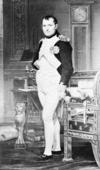- napoleon
-
/neuh poh"lee euhn, -pohl"yeuhn/, n.1. a pastry consisting of thin layers of puff paste interlaid with a cream or custard filling.2. a former gold coin of France, equal to 20 francs and bearing a portrait either of Napoleon I or of Napoleon III.3. Cards.a. a game in which the players bid for the privilege of naming the trump, stating the number of tricks they propose to win.b. a bid in this game to take all five tricks of a hand.[1805-15; < F napoléon]
* * *
born Aug. 15, 1769, Ajaccio, Corsicadied May 5, 1821, St. Helena IslandFrench general and emperor (1804–15).Born to parents of Italian ancestry, he was educated in France and became an army officer in 1785. He fought in the French Revolutionary Wars and was promoted to brigadier general in 1793. After victories against the Austrians in northern Italy, he negotiated the Treaty of Campo Formio (1797). He attempted to conquer Egypt (1798–99) but was defeated by the British under Horatio Nelson in the Battle of the Nile. The Coup of 18–19 Brumaire brought him to power in 1799, and he installed a military dictatorship, with himself as First Consul. He introduced numerous reforms in government, including the Napoleonic Code, and reconstructed the French education system. He negotiated the Concordat of 1801 with the pope. After victory against the Austrians at the Battle of Marengo (1800), he embarked on the Napoleonic Wars. The formation of coalitions of European countries against him led Napoleon to declare France a hereditary empire and to crown himself emperor in 1804. He won his greatest military victory at the Battle of Austerlitz against Austria and Russia in 1805. He defeated Prussia at the Battles of Jena and Auerstedt (1806) and Russia at the Battle of Friedland (1807). He then imposed the Treaty of Tilsit on Russia, ending the fourth coalition of countries against France. Despite his loss to Britain at the Battle of Trafalgar, he sought to weaken British commerce and established the Continental System of port blockades. He consolidated his European empire until 1810 but became embroiled in the Peninsular War (1808–14). He led the French army into Austria and defeated the Austrians at the Battle of Wagram (1809), signing the Treaty of Vienna. To enforce the Treaty of Tilsit, he led an army of about 600,000 into Russia in 1812, winning the Battle of Borodino, but was forced to retreat from Moscow with disastrous losses. His army greatly weakened, he was met by a strong coalition of allied powers, who defeated him at the Battle of Leipzig (1813). After Paris was taken by the allied coalition, Napoleon was forced to abdicate in 1814 and was exiled to the island of Elba. In 1815 he mustered a force and returned to France to reestablish himself as emperor for the Hundred Days, but he was decisively defeated at the Battle of Waterloo. He was sent into exile on the remote island of St. Helena, where he died six years later. One of the most celebrated figures in history, Napoleon revolutionized military organization and training and brought about reforms that permanently influenced civil institutions in France and throughout Europe. Napoleon in His Study, by Jacques-Louis David, 1812. In the National Gallery of Art, ...Courtesy of the National Gallery of Art, Washington, D.C., the Samuel H. Kress Collection; photograph, Giraudon/Art Resource, New York
Napoleon in His Study, by Jacques-Louis David, 1812. In the National Gallery of Art, ...Courtesy of the National Gallery of Art, Washington, D.C., the Samuel H. Kress Collection; photograph, Giraudon/Art Resource, New York* * *
Universalium. 2010.
